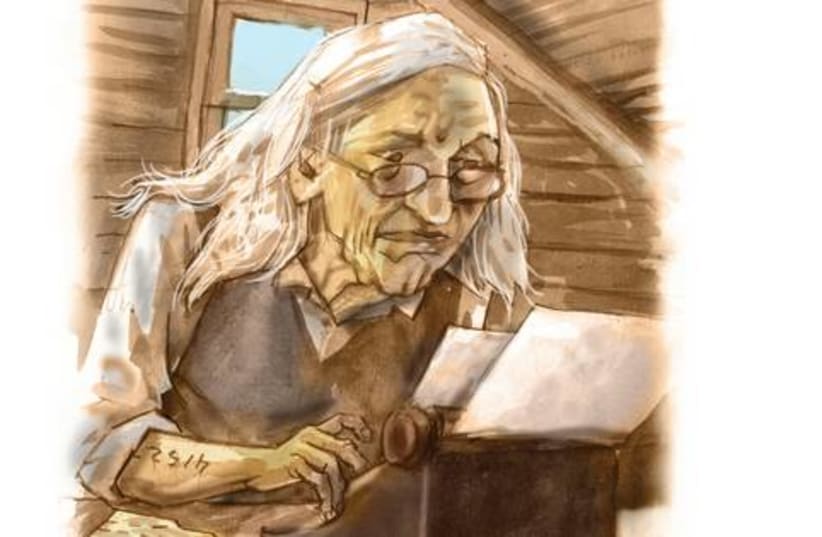Fake survivorThe one exception is Kugel’s mother, who has claimed (ever since her husband left her and her children decades earlier) to be a Holocaust survivor, when she is really the product of a happy and comfortable middle-class American upbringing.“Mother had never been in a war. She’d never been anywhere near a war, unless you count the holiday sales at Bamberger’s the morning after Thanksgiving,” Kugel says. Still, she insists she sees the faces of relatives in photos in Holocaust history books, and that the shade on her bedside lamp is Kugel’s grandfather… or grandmother… or uncle. Never mind that it is stamped “Made in Taiwan” (“Well, do you really expect them to put ‘Made in Auschwitz’ on it?”).Kugel’s mother, who has a large portrait of Alan Dershowitz over her bed, is overjoyed by the fact that none other than Anne Frank is up in the attic. She dresses up every time she goes up to see her, and she makes up a bed for her Holocaust heroine, complete with a child’s bedspread, a teddy bear, one-piece pajamas and a Hello Kitty alarm clock that she imagines the Anne Frank forever frozen in time would have liked. It’s “a childscape… a won’t-letit- go tableau,” as Kugel describes it. When Kugel considers calling the police to get rid of Anne, his mother snaps, “What’s the matter, you didn’t have Dr. Mengele’s number?”It is for these kinds of absurdist details and iconoclastic, caustic quips that “Hope: A Tragedy” is worth reading. While it is lacking as a novel (many would prefer Philip Roth’s imagined young, sexy Anne in “The Ghostwriter”) and traverses already familiar philosophical ground, no other young American Jewish writer today can tackle the Holocaust’s legacy with quite such piercing dark humor.In Auslander’s hands, Anne Frank is no longer that famous, talented and tragic girl in the attic yearning for freedom and writing about her faith in mankind in spite of it all: she is what we have turned her into.“Me, I’m the sufferer. I’m the dead girl. I’m Miss Holocaust, 1945,” Anne Frank tells Kugel, and by extension all of us who have made of her someone and something other than who she really was or was probably ever meant to be.
Anne Frank in his attic
A young American Jewish writer tackles the Holocaust's legacy with piercing dark humor.

Fake survivorThe one exception is Kugel’s mother, who has claimed (ever since her husband left her and her children decades earlier) to be a Holocaust survivor, when she is really the product of a happy and comfortable middle-class American upbringing.“Mother had never been in a war. She’d never been anywhere near a war, unless you count the holiday sales at Bamberger’s the morning after Thanksgiving,” Kugel says. Still, she insists she sees the faces of relatives in photos in Holocaust history books, and that the shade on her bedside lamp is Kugel’s grandfather… or grandmother… or uncle. Never mind that it is stamped “Made in Taiwan” (“Well, do you really expect them to put ‘Made in Auschwitz’ on it?”).Kugel’s mother, who has a large portrait of Alan Dershowitz over her bed, is overjoyed by the fact that none other than Anne Frank is up in the attic. She dresses up every time she goes up to see her, and she makes up a bed for her Holocaust heroine, complete with a child’s bedspread, a teddy bear, one-piece pajamas and a Hello Kitty alarm clock that she imagines the Anne Frank forever frozen in time would have liked. It’s “a childscape… a won’t-letit- go tableau,” as Kugel describes it. When Kugel considers calling the police to get rid of Anne, his mother snaps, “What’s the matter, you didn’t have Dr. Mengele’s number?”It is for these kinds of absurdist details and iconoclastic, caustic quips that “Hope: A Tragedy” is worth reading. While it is lacking as a novel (many would prefer Philip Roth’s imagined young, sexy Anne in “The Ghostwriter”) and traverses already familiar philosophical ground, no other young American Jewish writer today can tackle the Holocaust’s legacy with quite such piercing dark humor.In Auslander’s hands, Anne Frank is no longer that famous, talented and tragic girl in the attic yearning for freedom and writing about her faith in mankind in spite of it all: she is what we have turned her into.“Me, I’m the sufferer. I’m the dead girl. I’m Miss Holocaust, 1945,” Anne Frank tells Kugel, and by extension all of us who have made of her someone and something other than who she really was or was probably ever meant to be.